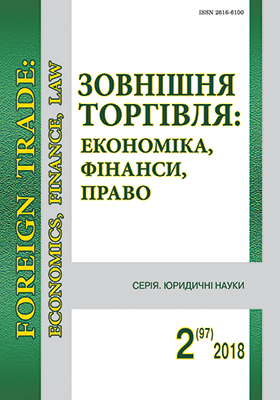THE THEORETICAL BASIS FOR SELF-REGULATION OF ECONOMIC ACTIVITY
Keywords:
self-regulation, self-regulation of economic activity, business entities, economic activity, self-regulatory organizations, legal regulationAbstract
Background. The study of issues of self-regulation of economic activity and directions for its settlement requires the study of the general theory of self-regulation asa systemic phenomenon through the prism of epistemological understanding of all its manifestations, synergy-dialectical interrelation with close, related legal phenomena.
Analysis of recent research and publications. Certain theoretical aspects of this legal phenomenon were left behind by the attention of scholars. In particular, the issue of self-regulation of economic activity asa complex system has not developed.
The aim of the article to determine the theoretical basis for self-regulation of economic activity by analyzing the content of related concepts (self-organization) and defining self-regulation asa systemic social phenomenon.
Materials and methods. In studying the proposed problem, the following methods were used: general philosophical and general scientific (dialectical, systemic, formal-logical, etc.); universal (induction, deduction); special-scientific (formal-legal, comparative law), etc. One of the main methods used was the functional study of self-regulation of economic activity through the prism of functional purpose. The information base of the research is the Constitution of Ukraine, the current laws of Ukraine, the Economic Code of Ukraine, and the scientific works of domestic scientists.
Results. In the science of economic law it is necessary to differentiate the self-regulation of economic activity asa relatively complex, homogeneous and stable in content system (group) of the rules of law with the inherent (specific) characteristics of the subject, internal structure and means, the basis of which are synergistic principles and methods (self-organization).
Extrapolating the proposed provision to the subject of this study it can be emphasized that self-regulation is one of the functions of economic activity, which helps it to adapt to changes for effective functioning, and self-organization of economic activity accordingly is the ability, the feature within which self-regulation is carried out.
Self-regulation asa function of economic activity isa kind of regulatory function. All economic entities accordingly have the potential (competence) for self-regulation. Self-regulation of economic activity is implemented at the initial stage by all economic entities, since it is difficult to imaginea business entity that does not enter into any contract, which is, accordingly, a means of self-regulation. However, not all subjects of self-regulation go to another level (secondary), creating appropriate sectoral self-regulatory organizations to protect their interests.
Conclusion. Consequently, the notion of self-regulation is polysemic. In law, it can be understood both asa function and an opportunity (property) of the whole legal system, as well as of its separate element. At the same time, self-regulation can be manifested both asa process and asa kind of legal regulation. Therefore, self-regulation of economic activity isa system education that includes interconnected structural elements that interact with other elements of the system of law in the legal field asa whole.
References
Bakalins'ka O. O. Pravovi problemy rozvytku samoreguljuvannja v sferi dobrosovisnoi' konkurencii' Ukrai'ny. Pravo i suspil'stvo. 2014. № 2. S. 63–69.
Beljanevych O. A., Bezuhov O. V., Bakalins'ka O. O. ta in. Pytannja samoreguljuvannja gospodars'koi' dijal'nosti. Stabil'nist' cyvil'nogo oborotu v Ukrai'ni: problemy zabezpechennja. Zb. naukovyh prac'. Vyp. 4. ; za red. O. A. Beljanevych. Kyi'v : NDI pryvatnogo prava i pidpryjemnyctva NAPrN Ukrai'ny. 2016. 200 s.
Mahinchuk V. M. Pryvatnopravove reguljuvannja pidpryjemnyc'kyh vidnosyn v Ukrai'ni. Kyi'v : Jurinkom Inter, 2013. 320 s.
Kryvcova I. S. Metodologichna rol' synergetyky u porivnjal'no-pravovomu piznanni: avtoref. dys… kand. juryd. nauk zi spec. 12.00.01 – teorija ta istorija derzhavy i prava; istorija politychnyh i pravovyh uchen'. Odes'ka nac. juryd. akad. Odesa, 2008. 22 s.
Velykyj tlumachnyj slovnyk suchasnoi' ukrai'ns'koi' movy ; uklad. i golov. red. V. T. Busel. Kyi'v ; Irpin' : VTF «Perun», 2004. 1440 s.
Popov S. M. Filosofija zvorotnogo zv'jazku u paradygmi samoreguljacii' skladnyh suchasnyh social'nyh system. Gumanitar. visn. Zaporiz'. derzh. inzhener. akad. 2011. Vyp. 46. S. 65–83.
Mochernyj S. V., Larina Ja. S., Ustenko O. A., Jurij S. I. Ekonomichnyj encyklopedychnyj slovnyk: U 2 t. T. 2 ; za red. S. V. Mochernogo. L'viv : Svit, 2006. 568 s.
Samoreguljacija social'nogo organizmu krai'ny : monografija ; za nauk. red. V. P. Beha : V. P. Beh (golova), N. V. Krohmal', G. O. Nesterenko ; M-vo osvity i nauky; Nac. ped. un.-t im. M. P. Dragomanova. Kyi'v : Vyd-vo NPU im. M. P. Dragomanova, 2010. 652 s.
Tarahonych T. I. Vydy pravovogo reguljuvannja: teoretychni aspekty rozuminnja. Chasop. Kyi'v. un-tu prava. 2014. № 4. S. 28–31.
Goncharenko O. M. Pryncypy samoreguljuvannja gospodars'koi' dijal'nosti. Nauk. visn. Uzhgorod. nac. un-tu. Serija : Pravo. 2016. Vyp. 39. T. 1. S. 81–84.
Mazaraki N. Mediacija v Ukrai'ni: problemy teorii' ta praktyky. Zovnishnja torgivlja: ekonomika, finansy, pravo. 2016. № 1. S. 92–100.



